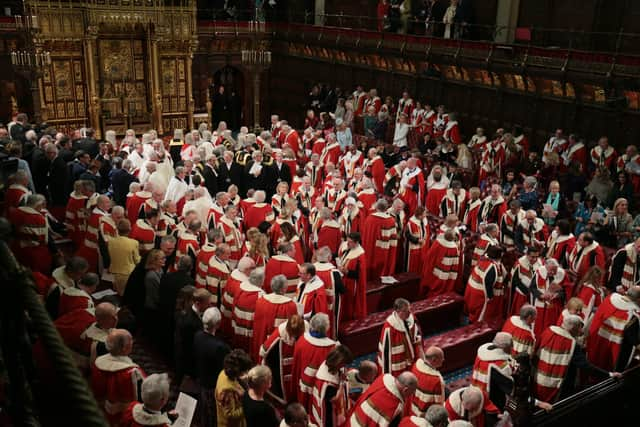Charles steps in for Queen at State Opening of Parliament
and live on Freeview channel 276
The monarch, 96, reluctantly pulled out of the major ceremonial occasion as she continues to experience “episodic mobility problems” with royal doctors advising her against attending.
As Charles takes on the head of state’s major constitutional duty for the first time, the move, believed to be unprecedented in modern history, will be interpreted as a significant shift in his responsibilities as a king in waiting.
Advertisement
Hide AdAdvertisement
Hide AdThe Duke of Cambridge, also a future monarch, will attend the State Opening, the first time William has done so.


Buckingham Palace said in a statement: “The Queen continues to experience episodic mobility problems, and in consultation with her doctors has reluctantly decided that she will not attend the State Opening of Parliament tomorrow.
“At Her Majesty’s request, and with the agreement of the relevant authorities, The Prince of Wales will read The Queen’s Speech on Her Majesty’s behalf, with The Duke of Cambridge also in attendance.”
A new Letters Patent authorised by the Queen was issued to cover the State Opening delegating to Counsellors of State the royal function of opening a new session of Parliament.
Advertisement
Hide AdAdvertisement
Hide AdIn this instance, it enables Charles and William to jointly exercise that function.
No other functions have been delegated by the Queen.
The decision was taken on Monday.
The government will set out its plans for new laws in the speech.
The government is expected to use the speech to bring forward changes to Northern Ireland’s post-Brexit trading arrangements.
However, Deputy Prime Minister Dominic Raab refused on Sunday to say whether new measures would be included.
Advertisement
Hide AdAdvertisement
Hide Ad“What we’re going to be focusing on this week is what our plans are to drive up the economy, protect the cost of living,” Mr Raab told Sky News.
He added: “We’re going to be talking about reforming the agricultural sector, innovation to create cheaper, healthier food.
“We’re going to be talking about areas where Britain has a real comparative advantage, tech, financial services.”
Reports of proposed changes come as the government grapples with the implications of Sinn Fein’s success in the Stormont Assembly elections.
Advertisement
Hide AdAdvertisement
Hide AdPrime Minister Boris Johnson has also said he has plans for a “super seven” set of bills aimed at changing laws the UK inherited from the EU.
Meanwhile, a reference to legislation around the culture and language in Northern Ireland is expected to be made in the Queen’s Speech, Mary-Lou McDonald has said.
The Sinn Fein president said she received assurances over the legislation during her party’s meeting with Northern Ireland Secretary Brandon Lewis on Monday.
There had been an expectation that the Westminster government would introduce the legislation before the Stormont election last week.
Advertisement
Hide AdAdvertisement
Hide AdIt fell to the Northern Ireland Office after the Stormont parties were unable to agree to introduce cultur al and language legislation in the Assembly which was part of the New Decade, New Approach deal.
The plans include an Office of Identity and Cultural Expression to promote respect for diversity as well as an Irish language commissioner and a commissioner to develop language, arts and literature associated with the Ulster-Scots/Ulster-British tradition.
However, Mr Lewis announced in March that the legislation would not be introduced ahead of the Assembly election.
Ms McDonald said her team raised the legislation with Mr Lewis during their meeting.
Advertisement
Hide AdAdvertisement
Hide Ad“The commitment now is that there will be reference to Acht Gaeilge in the Queen’s Speech and that legislation will be brought forward very soon,” she said.
“We don’t have a precise date but we again have a very precise commitment, and this is a long-running saga and a really unnecessary drama around recognising the rights of Irish language speakers.”